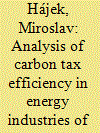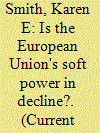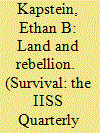|
|
|
Sort Order |
|
|
|
Items / Page
|
|
|
|
|
|
|
| Srl | Item |
| 1 |
ID:
169747


|
|
|
|
|
| Summary/Abstract |
A carbon tax is one of economic policy instruments of environmental protection supposed to contribute to the reduction of greenhouse gas (GHG) emissions. A functional carbon tax aims at incorporating costs for elimination of environmental harm into the pricing decisions. In terms of global climate change, the carbon tax is usually imposed on the production, distribution or consumption of carbon-content fossil fuels. The main aim of the study is to evaluate the carbon tax environmental effectiveness in the energy industries of selected EU countries, namely Sweden, Finland, Denmark, Ireland and Slovenia. To achieve the principal research objective, the multiple panel regression method for the selected variables was used, the synergy of other environmental policy tools being taken into account. Control variables employed were emission allowance price, household final consumption expenditure, corporate investments, solid fuel consumption and renewable energy consumption. The analysis results suggest that the carbon tax in the energy industry is environmentally efficient, an increased tax rate allowing to reduce GHG production, which is statistically significantly affected by the consumption of fossil fuels. Based on the estimated partial regression coefficient (−0.01158), raising the carbon tax by one euro per tonne can cut annual per capita emissions by 11.58 kg.
|
|
|
|
|
|
|
|
|
|
|
|
|
|
|
|
| 2 |
ID:
129208


|
|
|
|
|
| Publication |
2014.
|
| Summary/Abstract |
Almost twenty-five years ago, the political scientist Joseph S. Nye Jr. coined the term "soft power" to capture the influence that the United States exercises not through coercion or inducement but through attraction. Coercion and inducement-the stick and the carrot-are forms of command power (or what Nye calls "hard power"), delivered via economic, diplomatic, or military instruments. Command power is used to compel or bribe others to do what you want them to do. Soft power, in contrast, is less a policy instrument to be wielded than an indirect force; it emanates from the attractiveness of a state's culture, political values, and foreign policies. Soft power encourages other international actors to cooperate with a state (or a multistate organization like the European Union) to pursue what they perceive as shared goals and values. It is therefore a less costly means of attaining desired outcomes than the use of command power.
|
|
|
|
|
|
|
|
|
|
|
|
|
|
|
|
| 3 |
ID:
128846


|
|
|
|
|
| Publication |
2014.
|
| Summary/Abstract |
A study of land reform illuminates the paradox of economic instruments in counter-insurgency. Where redistributive demands are at the core of a rebellion, foreign powers will find it difficult to respond effectively. Recent years have seen the United States and its allies embroiled in major counter-insurgency campaigns in Afghanistan and Iraq, and lesser operations in such countries as Yemen and Somalia. These battles against local insurgencies are only the latest in a string of such conflicts that have erupted in nearly every developing region since the end of the Second World War. Sharply debated at home and abroad, they raise the fundamental question of what the counter-insurgents can reasonably hope to achieve in violent settings, even when they deploy an array of military, political and economic instruments. What are the 'moving parts' that foreign powers can manipulate in their efforts to force or encourage violence-reducing reforms in these societies?
|
|
|
|
|
|
|
|
|
|
|
|
|
|
|
|
| 4 |
ID:
144031


|
|
|
|
|
| Summary/Abstract |
Despite boasting the most powerful economy on earth [1], the United States too often reaches for the gun instead of the purse in its foreign policy. The country has hardly outgrown its need for military force [2], but over the past several decades, it has increasingly forgotten a tradition that stretches back to the nation’s founding: the use of economic instruments[3] to accomplish geopolitical objectives, a practice we term “geoeconomics.”
|
|
|
|
|
|
|
|
|
|
|
|
|
|
|
|
| 5 |
ID:
154728


|
|
|
|
|
| Summary/Abstract |
The environment and the economy are basic and inseparable elements. The environment is the locus
and support for the activities of human life. These activities are related to the creation and supply of
resources necessary for the economy. They generate large amounts of waste, while the load capacity of the
environment is limited. When economic operations go beyond certain limits, then the environment cannot
sustain them. This could lead to economic crisis on a global scale. The problem is how to protect the
environment, maintain economic operations and improve the lives of human beings, or in other words,
find the ways to harmonise environmental factors with the needs of the economy. Vietnam and other
developing nations are facing serious problems of environmental degradation, especially in urban areas.
Many solutions have been tried, of which the use of economic instruments has received much attention
on the part of the government and leaders of Vietnam. This article focuses on the use of economic instruments
in urban environment management in Vietnam. The objectives of this article are to explore how
economic instruments are being used for urban environment management and to point out the issues and
difficulties emerging in the process of using this tool to control environmental pollution and to improve
the quality of the environment.
|
|
|
|
|
|
|
|
|
|
|
|
|
|
|
|
|
|
|
|
|